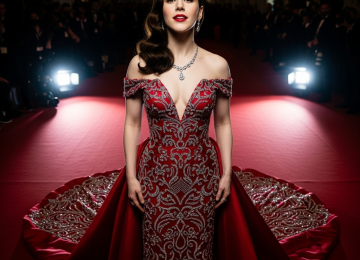Jacob Elordi & Oscar Isaac’s $120 Million ‘Frankenstein’ Gamble: 10 Hours in Makeup, a Misunderstood Monster, and Why It’s Not Just Horror
Netflix is betting big, and this time, the stakes are monstrous. The streaming giant has reportedly poured an astonishing $120 million into a new adaptation of Mary Shelley’s seminal novel, “Frankenstein.” Spearheaded by the formidable duo of Jacob Elordi as the titular creator, Victor Frankenstein, and Oscar Isaac as the enigmatic and tragic Creature, this ambitious project promises to be a radical reimagining of a story as old as literature itself. Far from a typical jump-scare fest, early indications suggest a deep dive into the philosophical and emotional core of the narrative, exploring themes of creation, responsibility, and the very essence of humanity. With a reported 10 hours of complex prosthetics and makeup for Isaac’s transformation, this “Frankenstein” is shaping up to be less about cheap thrills and more about profound, unsettling truths.
A Monumental Investment: Why Netflix is Betting on Gothic Grandeur
The $120 million price tag for this “Frankenstein” adaptation is a clear indicator of Netflix’s serious intent. In an era where content is king and competition is fierce, the platform is not shying away from high-stakes, high-concept projects. “Frankenstein,” a story that has permeated popular culture for over two centuries, offers a rich tapestry of emotional depth and societal commentary that resonates even today. The success of period dramas and sophisticated genre pieces on streaming platforms has likely emboldened Netflix to invest such a substantial sum into a classic with universal appeal. This isn’t just about retelling a story; it’s about making a statement. By attaching A-list talent like Elordi and Isaac, and reportedly assembling a world-class creative team, Netflix is signaling its commitment to delivering a cinematic experience that transcends the typical streaming fare. The gamble lies in whether this ambitious vision can translate into a captivating narrative that appeals to both die-hard literary fans and a broader audience seeking intelligent, thought-provoking entertainment.

The sheer scale of the production hints at a desire to create something truly memorable. Early whispers from set insiders suggest an unwavering attention to detail, from the meticulously crafted Victorian-era costumes to the sprawling, atmospheric set designs. This level of commitment is crucial for a story like “Frankenstein,” which relies heavily on its evocative atmosphere to convey the psychological states of its characters and the unsettling nature of its themes. The financial investment also suggests a global outlook, with Netflix aiming to appeal to audiences worldwide who may have grown up with different interpretations of Shelley’s creation. The challenge, therefore, is to honor the source material’s complexity while making it accessible and compelling for a modern audience, a balancing act that has tripped up many ambitious adaptations in the past.
Elordi and Isaac: A Creator and His Creature Redefined
The casting of Jacob Elordi as Victor Frankenstein and Oscar Isaac as the Creature is a stroke of genius that instantly elevates this adaptation. Elordi, known for his magnetic presence in “Euphoria” and “The Kissing Booth” franchise, brings a youthful intensity and brooding charisma that could perfectly capture Victor’s obsessive genius and inherent arrogance. His past performances have shown a capacity for portraying characters wrestling with inner demons, a trait essential for the driven, guilt-ridden scientist.

Oscar Isaac, on the other hand, is a chameleon of the highest caliber, capable of imbuing characters with immense gravitas and profound pathos. His work in “Inside Llewyn Davis,” “Dune,” and “Moon Knight” demonstrates his ability to inhabit complex, morally ambiguous figures. For the Creature, Isaac is poised to deliver a performance that eschews the lumbering, unintelligent monster of popular myth. Shelley’s Creature is articulate, intelligent, and deeply philosophical, driven by a profound sense of abandonment and a yearning for connection. Isaac’s renowned ability to convey deep emotional turmoil through subtle nuances suggests he will bring a heartbreaking humanity to the Creature, making his plight as compelling as Victor’s ambition.
The dynamic between these two actors is where the heart of this “Frankenstein” will likely lie. Elordi’s Victor, fueled by a hubristic desire to conquer death, will be directly confronted by the consequences of his actions embodied by Isaac’s Creature. This isn’t just about a scientist playing God; it’s about the devastating ripple effect of ambition and the creator’s ultimate responsibility for their creation. The contrast in their on-screen personas – Elordi’s youthful intensity against Isaac’s mature, soulful presence – promises a compelling push and pull that will drive the narrative.
The Grueling Transformation: 10 Hours in Makeup for the Creature
The reported 10 hours of makeup and prosthetics for Oscar Isaac’s Creature is a testament to the production’s dedication to a visceral and authentic portrayal. This is not the simplistic stitches and bolts of classic horror films. Shelley’s description of the Creature is one of grotesque, cobbled-together features, a being that is aesthetically repellent yet possesses a sentient mind. The sheer amount of time required for Isaac’s transformation suggests a commitment to detailed, nuanced facial and bodily alterations that will convey the unnatural origin of the Creature and the profound impact it has on his existence.

This level of commitment to practical effects, especially in an age dominated by CGI, can be a game-changer. It grounds the character in a tangible reality, allowing Isaac to truly *inhabit* the role rather than simply being a digital construct. The experience of spending 10 hours in makeup daily is an ordeal in itself, and it’s a commitment that speaks volumes about Isaac’s dedication to the character and the filmmakers’ vision. It implies that the Creature’s physical form will be a significant element in conveying his inner turmoil and his ostracization from society. The discomfort and alienation of such a transformation will likely seep into Isaac’s performance, creating a Creature that is not just visually striking but emotionally resonant. This meticulous approach to the Creature’s appearance is crucial for a story where appearance often dictates perception, and the Creature’s very existence is a product of humanity’s judgment.
The sheer dedication to the practical aspects of the Creature’s design also hints at a desire to capture the unsettling beauty within the monstrosity that Shelley so eloquently described. The goal is likely not to make him conventionally hideous, but to create a being whose features are a disturbing amalgamation, reflecting his artificiality and the unnatural process of his creation. This extended makeup process allows for a level of detail and texture that can add layers of character and history to the Creature’s face, making him more than just a monster; he becomes a testament to Victor’s ambition and its horrifying consequences.
More Than Horror: Unpacking the Philosophical Depths
Crucially, this Netflix “Frankenstein” is being positioned as something far beyond a traditional horror film. While the gothic origins and the inherent darkness of the story provide fertile ground for suspense and dread, the true power of Mary Shelley’s novel lies in its profound philosophical inquiries. The narrative is a deep exploration of nature versus nurture, the ethics of scientific advancement, the burden of parental responsibility, and the human need for love and acceptance.

Victor Frankenstein is not a mad scientist in the cliché sense; he is a brilliant, ambitious individual consumed by the desire to transcend the limitations of mortality. His creation is an act of pure intellectual curiosity and a quest for ultimate knowledge. However, his immediate rejection of the Creature, based solely on its appearance, is the catalyst for the tragedy that unfolds. The Creature, initially innocent and seeking knowledge and companionship, is driven to acts of violence by the constant fear and prejudice he faces from humanity, including his own creator.
This Netflix adaptation appears poised to lean into these complex themes. The choice of Elordi and Isaac, actors known for their ability to convey psychological depth, suggests a focus on the internal struggles of both characters. The $120 million budget allows for the visual storytelling necessary to create an immersive world that reflects the intellectual and emotional landscape of the novel. This isn’t about whether the Creature will chase Victor through a dark forest; it’s about the existential questions of what it means to be human, the consequences of playing God, and the pervasive nature of loneliness and rejection.
The filmmakers are reportedly aiming for a character-driven drama that uses the framework of science fiction to ask timeless questions about our own existence. The “horror” in “Frankenstein” is not primarily derived from jump scares or gore, but from the psychological torment, the existential dread, and the moral failings of its characters. By presenting the Creature as a complex, sympathetic figure, the adaptation forces the audience to confront their own biases and question who the true monster really is. This nuanced approach is what will set this version apart and justify the significant investment.
A Modern Mirror: Why Frankenstein Still Matters
Mary Shelley’s “Frankenstein,” written in 1818, remains remarkably relevant today. In an era of rapid technological advancement, particularly in fields like artificial intelligence, genetic engineering, and bioethics, the novel’s cautionary tale about the unchecked pursuit of knowledge and the ethical responsibilities of creators is more pertinent than ever. The creation of life, or something that mimics it, is no longer purely the realm of gothic fiction; it is a burgeoning reality that raises profound ethical questions.

The Netflix adaptation, with its significant budget and star power, has the potential to bring these complex discussions to a mainstream audience. By focusing on the humanity and suffering of the Creature, and the internal torment of Victor, the series can serve as a modern mirror, reflecting our own societal anxieties about progress and the potential for unintended consequences. The $120 million gamble is not just on a classic story, but on the enduring power of its message.
The exploration of societal prejudice, particularly the Creature’s ostracization based on his appearance, is another theme that resonates deeply in contemporary society. The story forces viewers to consider how we treat those who are different, and how our judgments can shape individuals and lead to devastating outcomes. The narrative’s exploration of the creator’s responsibility for their creation – whether it be a scientific experiment, a child, or even an idea – is a timeless concern that this ambitious adaptation has the opportunity to explore with unprecedented depth. By presenting a visually stunning and emotionally intelligent interpretation, Netflix’s “Frankenstein” could very well become a cultural touchstone for a new generation, sparking conversations about science, ethics, and the very definition of humanity. This is not just a retelling; it’s a re-examination of a story that continues to haunt our collective imagination for all the right reasons.















